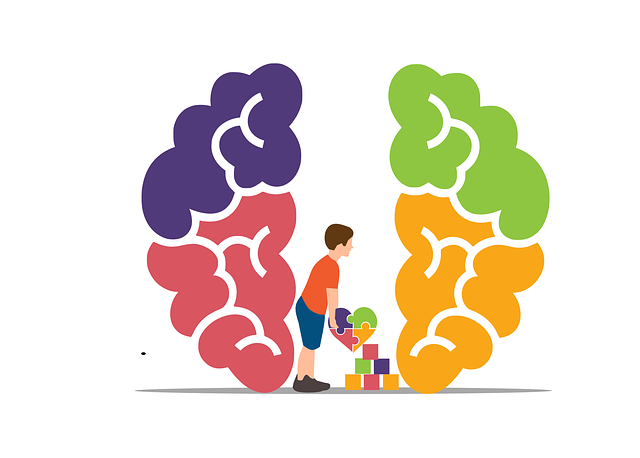Elderly individuals with Functional Neurological Disorders (FNDs) face significant challenges, including misdiagnosis and limited access to appropriate therapy, impacting their daily lives and independence. Public awareness campaigns play a vital role in combating this issue by educating the public, fostering empathy, improving communication with seniors exhibiting symptoms, and enabling earlier detection. These initiatives empower caregivers, address misconceptions, promote understanding, and enhance therapy outcomes for elders with FNDs. Effective awareness campaigns can revolutionize care through strategic messaging, collaboration, and inclusive design, ultimately leading to improved emotional regulation within communities and better access to therapy for elders functional neurological disorder. Measuring campaign impact is crucial for continuous improvement and refinement of messages and strategies.
Public awareness campaigns play a pivotal role in addressing Elderly Functional Neurological Disorders (FNDs), conditions that impact daily living. This article delves into the significance of raising awareness among caregivers, exploring effective strategies for targeted outreach, and highlighting success measurement techniques.
By understanding FNDs, we can empower caregivers with knowledge and empathy, leading to improved therapy outcomes for elders. From campaign design to evaluation, each step contributes to a comprehensive approach, ultimately enhancing care and quality of life for those affected.
- Understanding Elderly Functional Neurological Disorders: Unveiling the Challenge
- The Role of Public Awareness: Educating and Empathizing with Caregivers
- Designing Effective Campaigns: Strategies for Targeted Outreach
- Measuring Impact: Evaluating Success and Shaping Future Initiatives
Understanding Elderly Functional Neurological Disorders: Unveiling the Challenge

The elderly population is facing a growing challenge with the rise in Functional Neurological Disorders (FNDs). These conditions, often underdiagnosed and miscomprehended, significantly impact daily life for seniors, hindering their ability to perform routine tasks and maintain independence. FNDs manifest as a wide range of symptoms, including cognitive impairment, memory loss, and motor dysfunction, which can be perplexing and frustrating for both the affected individuals and their caregivers.
Public awareness campaigns play a pivotal role in shedding light on these hidden disorders. By educating the public about FNDs, we can foster empathy building strategies and improve communication approaches when interacting with seniors exhibiting such symptoms. This, in turn, enables earlier detection and access to appropriate therapy for elders functional neurological disorder, ultimately enhancing their quality of life. Effective awareness initiatives can revolutionize care by breaking down barriers between understanding and support.
The Role of Public Awareness: Educating and Empathizing with Caregivers

Public awareness campaigns play a pivotal role in educating and empathizing with caregivers, especially those supporting elders with functional neurological disorders (FND). By shedding light on FND and its impact, these campaigns help dispel misconceptions and promote understanding. Caregivers often face significant challenges, from physical demands to emotional stress, so raising mental health awareness is crucial. They need support to recognize signs of caregiver burnout and access resources that foster resilience and well-being.
Integrating mind over matter principles can empower caregivers with effective coping strategies. Regularly, these campaigns emphasize the importance of risk assessment for mental health professionals, encouraging them to prioritize self-care while assisting others. Through comprehensive education, awareness initiatives ensure caregivers feel valued, equipped, and supported in their vital role, ultimately enhancing therapy outcomes for elders managing FND.
Designing Effective Campaigns: Strategies for Targeted Outreach

Designing effective public awareness campaigns for issues like Therapy for Elders with Functional Neurological Disorder (FND) requires a strategic approach to targeted outreach. One key strategy is employing Communication Strategies that resonate with the intended audience, tailoring messages to address specific concerns and misconceptions. For elderly populations, simple, clear language and visual aids can significantly enhance understanding and engagement.
Incorporating Cultural Sensitivity in Mental Healthcare Practice is equally crucial. Recognizing and respecting diverse cultural beliefs and practices ensures that campaigns are inclusive and accessible. This might involve collaborating with community leaders or organizations representing different ethnic backgrounds to ensure messages align with cultural norms. Additionally, focusing on Confidence Boosting can empower elders to seek help without stigma, emphasizing the transformative potential of therapy for their condition.
Measuring Impact: Evaluating Success and Shaping Future Initiatives

Measuring the impact of public awareness campaigns is paramount to understanding their effectiveness and shaping future initiatives. By evaluating success through various metrics, organizations can gain invaluable insights into what resonates with audiences and what needs improvement. This data-driven approach ensures that resources are allocated optimally, focusing on strategies that foster emotional healing processes and enhance mental wellness, particularly among vulnerable populations such as elders suffering from functional neurological disorders.
Successful campaigns often showcase improved emotional regulation within targeted communities, indicating a shift in perceptions and behaviors related to health and well-being. Such assessments facilitate the identification of campaign elements that prove most impactful—whether it’s through compelling storytelling, accessible information, or community engagement strategies. This knowledge is instrumental in refining messages and approaches for future initiatives, ensuring continuous improvement and greater success in raising awareness about critical issues like functional neurological disorders in elders.
Public awareness campaigns play a pivotal role in addressing Elderly Functional Neurological Disorders (EFNDs), offering crucial education and support. By understanding the challenges EFNDs present to caregivers, these initiatives facilitate empathy and encourage early intervention. Effective campaign design, focusing on targeted outreach strategies, is key to reaching at-risk populations. Through evaluating campaign impact, we can refine future initiatives, ultimately enhancing the accessibility of therapy for elders suffering from EFNDs and improving their quality of life.














